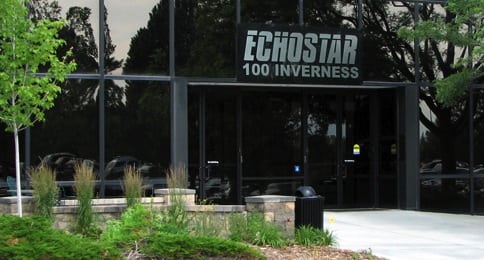Latest News

EchoStar headquarters in Engelwood, Colorado. Photo: EchoStar
EchoStar Corporation reported an 8.5% revenue decline in the first quarter of 2024 compared to the prior year, with subscriber declines in pay-TV, retail wireless, and satellite broadband. As the company reported financial results on May 8, amid a cash crunch to continue funding operations, one analyst predicted a bankruptcy is imminent.
Last quarter, EchoStar disclosed a “going concern” about its ability to continue operations without additional funds. This comes after EchoStar completed its acquisition of Dish Network in January.
According to its current 10-Q filing, EchoStar’s cash on hand at the end of March was $766 million. The company has $1.983 billion of debt maturing in November 2024, and is forecasting negative cash flows for the remainder of the calendar year 2024.
“Because we do not currently have committed financing to fund our operations for at least twelve months … substantial doubt exists about our ability to continue as a going concern,” EchoStar said in the 10-Q. “We do not currently have the necessary cash on hand and/or projected future cash flows to fund fourth quarter operations or the November 2024 debt maturity.”
CEO Hamid Akhavan said the company is working on a number of avenues to refinance its obligations and improve its cash position. “We have fielded a variety of offers and are pursuing those which can support our long term objectives,” he told investors on May 8. “The complex and delicate nature of this process demands time and confidentiality. We will certainly have more to share in due course.”
Akhavan told investors that he sees significant asset value on the balance sheet, relative to the company’s liabilities. He estimated that company’s spectrum ownership is worth “far more than the value of the obligations we have.” He said EchoStar is working to capitalize on the value of its asset to debt and turn it into liquidity to execute the company’s business.
“Candidly, can we push the maturities out? We’re very bullish about our prospects of our operating business if we have the capital to execute,” Akhavan said. “While we’re working on that financing, we’re not sitting on our hands and letting opportunities expire. We continue to develop them, so hopefully post-challenges on financing, we will have a good business to go forward.”
Telecommunications analyst Craig Moffett said in a research note on Wednesday that filing for bankruptcy in the next four to six months is now “the most likely outcome” for EchoStar.
And while EchoStar’s spectrum is “enormously valuable,” Moffett said that likely buyers AT&T, Verizon, and T-Mobile do not look to be in a position to spend aggressively on new spectrum. Moffett noted that both AT&T and Verizon have investment grade credit ratings, but have debt-to-EBITDA leverage ratios that are above investment grade guidelines. Both have also teased share repurchases.
“The intrinsic value of Dish’s assets in a bankruptcy liquidation is inarguably very high. Whether they could fetch anything like intrinsic value, however, is less clear,” Moffett wrote. “There are only three potential bidders, two of whom have badly overburdened balance sheets. There is no longer Dish itself as the marginal bidder. And the time value of money is a real consideration; a liquidation would potentially take a very long time. In fact, it’s not even clear that spectrum sales of any size would be allowed.”
First Quarter Financials
EchoStar reported total revenue of $4.01 billion for the first quarter 2024, compared to $4.39 billion in the year ago quarter.
Post-Dish acquisition, Pay-TV is by far the largest portion of the company’s business, making up about 70% of revenue. EchoStar reported an 8% revenue decline in Pay-TV compared to the same time last year as the business sheds subscribers.
Dish TV and Sling TV shed a combined 348,000 subscribers in the first quarter. The company closed the quarter with 8.18 million Pay-TV subscribers including 6.26 million Dish TV subscribers and 1.92 million Sling TV subscribers.
Retail Wireless reported a 7% decline in revenue compared to last year. This includes the Boost Mobile business. EchoStar reported $906 million in Retail Wireless sales in Q1. Retail Wireless lost 81,000 subscribers in the first quarter, ending the quarter with 7.3 million subscribers.
The Hughes brand of satellite internet continued to shed broadband subscribers in Q1. However, Hughes COO Paul Gaske told investors that the the business saw a smaller dip in subscribers than the past 10 quarters.
Broadband net subscribers decreased by 26,000 in the first quarter, compared to a decrease of 51,000 in the year-ago quarter. Hughes ended the quarter with 978,000 broadband subscribers.
The Broadband and Satellite Services segment posted a 13% revenue decline in the first quarter, reporting 382.6 million in revenue during the quarter. Gaske added that Hughes expects that enterprise revenues will surpass consumer broadband revenues this year.
Only the 5G Network Deployment segment increased revenue relative to last year, reporting $29.5 million in revenue in Q1, a 56% increase compared to the same time last year. This is the company’s smallest segment.
Stay connected and get ahead with the leading source of industry intel!
Subscribe Now